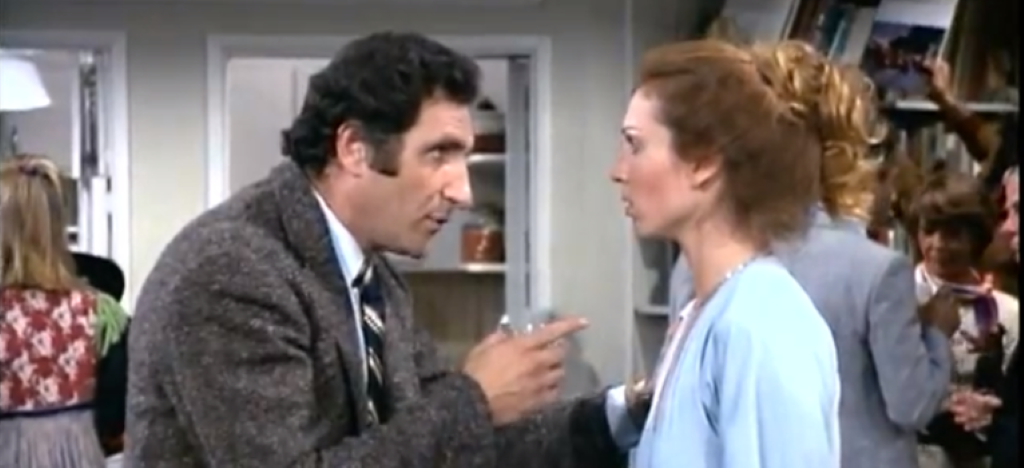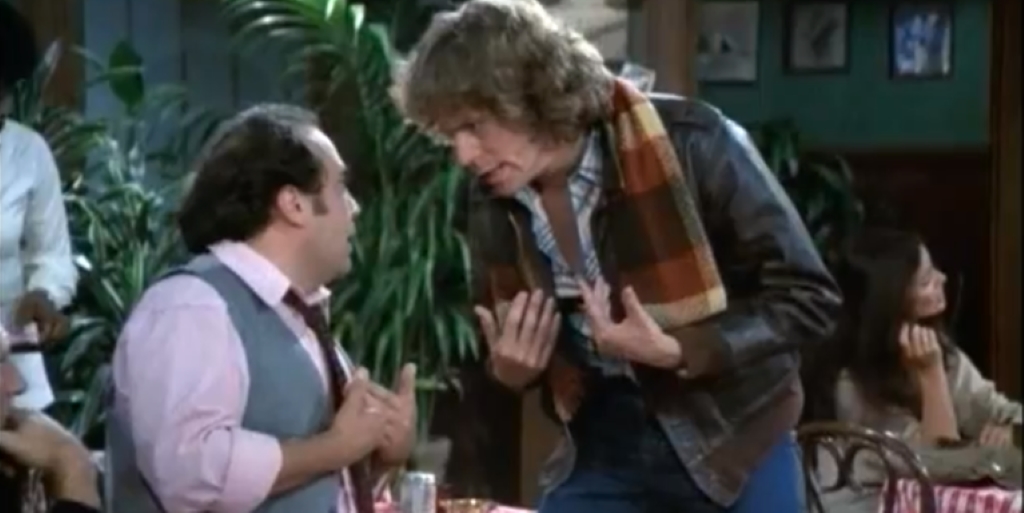Season 1, Episode 5: “Come As You Aren’t”
Original airdate: Oct. 10, 1978
Summary: Elaine hosts a party to impress her art gallery contacts, but she worries that her upscale guests might uncover her secret profession as a cab driver.
Astha: In week one, Elaine Nardo arrived at the Sunshine Cab Company with the intention of moonlighting.
She exuded confidence, particularly in contrast to her fellow newcomer, John, as she seamlessly integrated into the group, as noted by Nirajan in the second episode of the series.
However, when Elaine takes center stage in episode five, her confidence and camaraderie with the group appear to waver.
A bit more confidence and camaraderie would have enhanced an episode that lacked both tension and humor.
The soirée held at Chez Nardo in the heart of the episode “Come As You Aren’t” follows a classic sitcom formula: one character harbors a secret that they desperately need to conceal from all the guests, but their quirky friends are likely to disrupt it.
However, disappointingly, both aspects of this scenario don’t fully materialize.
The sense of urgency for keeping the secret side job hidden isn’t strongly conveyed, except for some anxious exchanges with Alex.
What’s more, the abrupt departures of Bobby, Tony, and even Latka after a mere thirty uneventful seconds sap the potential for chaotic comedy from the entire event.
While I didn’t anticipate “Taxi” to transform into a full-scale farce, the script missed several opportunities for comedic moments.
I did find the twist intriguing, where Elaine and Alex swapped positions regarding revealing the truth or perpetuating the lie.
I also appreciated that Elaine’s decision to come clean stemmed from a desire to assert her dignity, not wanting to be forgotten solely due to her occupation.
However, I never felt that the stakes were particularly high, to begin with, and as the charade unfolded, it became, to a significant extent, a story about Alex’s pursuit of romance.
The entire narrative seemed underdeveloped and had an unusual pacing right from the beginning.
The intended emotional climax, meant to be a poignant moment shared between Elaine and Alex, did not do justice to either character.
Alex’s behavior came across as immature and sulky, while Elaine’s response was disappointingly subdued, given that she had every reason to be upset with Alex’s pouting.
In fact, she had far more at stake if she were to reveal the truth compared to him.
Sidant: I share your perspective, Astha. In this particular episode, I found it challenging to fully engage with the main conflict, as I did when observing the trials and tribulations of Tony and Bobby in the previous week’s adventures.
The resolution of the story felt a bit too neatly packaged towards the end.
The final scenes swiftly transitioned from Elaine’s revelation to the realization that, apart from Alex’s disrupted romantic encounter, everything turned out positively.
It’s noteworthy that her art gallery friends were genuinely impressed by her ability to balance two jobs while supporting her family.
The episode’s delayed shift in focus to Alex’s acceptance of his dishonesty came too late to create a significant impact when it eventually backfired on him.
As you rightly pointed out, Tony and Bobby might not have even attended the party, which contributed to the overall sense that the episode lacked a well-constructed narrative, failing to deliver either as a comedic farce or as a sitcom episode. (On a lighter note, I can’t help but express my disappointment that Louie didn’t make an appearance at the party, despite Elaine’s threats to have him arrested. Imagine him pretending to be a wealthy friend of hers, adding an even more intricate layer of complexity to her charade. Now, that would have been true comedy.)

Nonetheless, I believe that this episode aims to explore an important theme within the series.
In the events of the previous week, we witnessed the cabbies, with the exception of Alex, yearning to break free from the confines of the garage and pursue their dreams.
In contrast, “Come As You Aren’t” delves into the less glamorous aspects of their profession, highlighting that being a taxi driver is not considered prestigious.
While Elaine may not feel ashamed of her job, she is concerned about how the knowledge of it could impact her professional aspirations.
There is a prevailing notion that being in this profession places you at the bottom rung and exposes you to potential dismissal.
Alex’s disappointment over not connecting with the blonde party guest is palpable, but the label of “garbage” for his actions seems to hurt him even more.
Bobby quickly deduces that the reason Elaine doesn’t want them to attend the party is that they are viewed as “nobodies” – individuals perceived as foolish, ignorant, and low-life cabbies.
This melancholic undertone aligns with the essence of a blue-collar show, offering a glimpse into the challenges faced by these characters.
It’s a dimension that contemporary shows like “2 Broke Girls” could benefit from incorporating more of into their narratives.
Additionally, I commend the show for taking a different approach than the typical Sam and Diane dynamic with Alex and Elaine.
There is a notable absence of any sexual tension between Judd Hirsch and Marilu Henner in the extended scenes where they are alone together.
I appreciate how he offers his assistance in preparing for the party, despite feeling slightly offended by her early trickery. It’s also admirable that he is willing to forgive her, recognizing the significance of her respect.
In an era when many sitcoms indulge in the “will they/won’t they” trope, it’s refreshing to see two mature adults maintain a platonic friendship and address their issues without the burden of sexual tension.
In all honesty, I may have had a more favorable opinion of it compared to both of you.
Nevertheless, I believe it’s the weaker of the two episodes this week.
The episode unquestionably falls short of realizing its potential for farcical humor as the other members of the garage either quietly make their exits or depart with a young lady during the party.
It’s intriguing to note that Bobby, Banta, and John left so swiftly, and this departure is worth discussing, notwithstanding the absence of comedic antics.
The key lies in the self-assured demeanor displayed by the three of them.
They walk with a similar swagger, don almost identical attire, and avoid engaging with others.
Their attempt to blend into the envisioned middle-class apartment, where it’s worth noting that Elaine had to borrow the furniture, is unsuccessful.
The stark contrast in furniture between the two sides of the apartment highlights this.
Rather than making an earnest effort and potentially facing embarrassment in Elaine’s constructed mock-classy setting, they succumb to the economic status they occupy and quietly exit.
If someone were to inquire about their occupations and dreams, what would their responses be? “I’m an actor who hasn’t had a job in three years.”
“I’m a boxer who believed he defeated the champion, but it was all a deception.”
As for John’s mysterious profession outside of cab driving, it remains elusive.
They would essentially need to fabricate their responses, and their departure is an unexpectedly candid yet melancholic reaction to a situation built entirely on falsehoods.
Nirajan: Nirajan eagerly anticipated this episode, mainly due to Elaine’s surprisingly seamless integration into the group.
The hope was for an episode centered on Elaine to achieve two objectives: character development akin to what was seen with Tony and Bobby and a deeper insight into her dynamics with the rest of the crew.
“Come As You Aren’t” does indeed fulfill the first goal, although not to the extent desired.
Unfortunately, it largely neglects the second goal.
Nevertheless, the episode effectively delves into Elaine’s struggles to provide for her children while juggling one job and chasing an ambitious dream with another.
It’s time well spent, and the inclusion of small details such as canned champagne and borrowed furniture adds depth to Elaine’s circumstances.
Yet, I also found it disappointing and somewhat peculiar that most of the remaining cast was sidelined.
Naveen, I appreciate your explanation, and it’s possible that the show’s writers aimed to introduce some variety and move away from the usual “the gang supports one of their own!” narratives.
However, I’m finding it hard to accept that Elaine is seamlessly integrated into the group, as we’ve witnessed in previous episodes.
Her portrayal here doesn’t align with her previous role. I wouldn’t mind if she remained somewhat of an outsider or didn’t entirely fit in with the other quirky individuals who crashed her elegant gathering.
It would make sense, given her newcomer status.
Nonetheless, the disparity between Elaine’s position in the group in the initial episodes and her stance here is intriguing. Could Bobby not have portrayed a more impressive or cooler persona?
Also Read: Roundtable Review: Taxi, “One-Punch Banta” and “Bobby’s Acting Career”
Season 1, Episode 7: “High School Reunion”
Original airdate: Oct. 24, 1978
Synopsis: Feeling down about his current life situation, Louie is anxious about encountering his former schoolmates at his twenty-year high school reunion. To cope with his unease, he enlists Bobby to attend the event on his behalf.
Astha: It’s puzzling that, for the second time in three weeks, the secondary storyline revolves around “Alex trying to find a romantic partner.”
If the network suggested this idea to make the show’s morally centered stand-up comedian, Alex, more passionate, it certainly stands out as one of the more unusual suggestions to ever reach the screen.
However, unlike in the previous episode, “Come As You Aren’t,” this subplot doesn’t diminish the quality of “High School Reunion,” which happens to be the funniest of the five episodes we’ve seen so far.
I’ve watched this episode multiple times, probably more than any other Taxi episode.
The trope of “one character pretending to be someone else” isn’t extremely common, but it’s still a trope and a challenging one to execute successfully.
It’s typically a storyline that appears later in a show’s run because it relies on the audience having a clear understanding of both the impersonator and the impersonator.
The writers of Taxi, however, recognized how unmistakable Louie DePalma’s character was, making him one of the most memorable characters in sitcom history.
“And my goodness, Jeff Conaway truly excels in his portrayal of Louie.
His stride, his contemptuous expression, and his voice dripping with disdain—it’s a convincing impersonation that’s also hilariously exaggerated.
Beyond being a comedic delight, it provides exceptional depth to Bobby’s character. Unlike the stereotypical ‘clueless actor,’ Bobby takes his craft seriously.
He’s taken the time to study Louie’s mannerisms, which is a practice I believe dedicated actors genuinely undertake.
He adeptly embodies the character during the reunion, quick-wittedly delivering a knockout punchline to Louie’s old rival: ‘I’m an auditor for the Internal Revenue Service.’
This episode holds significance for all the characters in its own way.
It’s the perfect moment to introduce subtlety into the dynamic between Louie and the cabbies.
The decision to do so in a casual setting, away from the workplace where Louie exerts his authority, is a brilliant move.
While they may not hold him in high regard (and for valid reasons), deep down, he remains a part of their group.”
Sidant discusses another episode of Taxi where someone at the cab company is aware of how their job is perceived and tries to hide the truth.
It’s also an episode where a character’s successful ruse is disrupted by a personal desire, like sniffing their high school crush’s hair.
Interestingly, these disruptions lead to positive outcomes; Elaine achieves professional validation, and Louie gains a satisfying sense of power over his past tormentors.
This episode marks Taxi’s development in character portrayal.
Danny DeVito’s performance as Louie improves with more screen time, giving depth to a character who is initially unsympathetic.
The moment when he discusses the high chair incident evokes genuine pathos.
Bobby’s impression of Louie is fantastic, and while Alex’s increased horniness may seem influenced by external factors, it doesn’t make him come across as sleazy or desperate.
However, Sidant remains uncertain about how the show handles Latka and questions the significance of Astha Kaufman’s presence on the show.
It’s unclear how influential Kaufman was in the classic 1970s comedy scene at that time. He appears briefly, performs his routine, and exits the scene.
I want to highlight another remarkable aspect of this episode that has been a recurring theme in our journey through Taxi.
It aligns with the ideas our friend and colleague Jaime Weinman discussed in his insightful essay in defense of the multi-cam sitcom: the deliberate pacing of the performance.
The opening scene at the bar, which spans nearly the entire first half of the episode, approximately 12 minutes, exudes a remarkable sense of rhythm.
Even as Alex occasionally diverts to flirt with the waitress or brings Louie back to the table, it doesn’t disrupt the flow of the action.
The viewer gets a genuine feeling of watching real people engage in a true conversation, albeit with a lot more humor than your typical hangout.
As we continue to delve into this show, I’m gaining a deeper understanding of why many people desire a return to this style of television.
It offers something unique, and in some cases, viewers feel disappointed when they are misled into thinking a show is like it.
*In line with our ongoing references to Community, I couldn’t help but notice a resemblance between the waitress and Professor Slater from that show when she mentioned her reluctance to date taxi drivers.

Naveen: While Conaway certainly shines in this episode, a few days later, I find that DeVito’s performance has left a more vivid impression.
DeVito’s portrayal offers a range of entertaining moments, from his comically awful duet with the jukebox to his snarls at those seated around the table.
What’s particularly striking is his ability to convey the wistful and nostalgic undertones of a man with a concealed brokenness, expressed through subtle inflections in his voice and his expressive, though not gleaming, eyes.
As a result, when Louie eventually reaches for Sheila’s hair, my desire for him to do so stems from a yearning for closure rather than a wish for him to realize that his co-workers actually care about him, despite their comments and avoidance.
DeVito’s performance is the linchpin in achieving this nuanced emotional impact.
In a broader context, both of these episodes from this week bring about redemption for their respective characters.
Elaine’s colleagues do not completely disrespect her for being a cabbie; instead, they recognize it as a means of supporting herself and her children.
She manages to salvage some dignity, especially in her interactions with the pompous individual from the opening scene.
Meanwhile, Louie attains everything he desires in a chaotic finale, experiencing the fleeting touch of Sheila’s hair and exacting revenge on their big night, akin to how they had ruined his prom.
These instances suggest that the garage doesn’t always crush dreams, leaving room for the possibility that these outcomes are not merely chance occurrences.
Nirajan: While we (or I) haven’t had the chance to watch many episodes of Taxi yet, this particular episode stands out as a shining example of comedic writing.
As Sidant pointed out, the first half of the episode unfolds within the confines of a bar setting, where each small story or gag serves a purpose and delivers humor.
The banter and storytelling at the table exhibit a similar strength.
We’ve discussed this aspect previously, but it’s worth highlighting once more how effectively the characters gel, despite any surface conflicts.
What I find enjoyable is that a significant portion of the show revolves around the characters sharing anecdotes from their lives, yet it never comes across as preachy.
This can be attributed to the exceptional writing, but the actors also excel at making relatively simple moments more vivid and lively.
“High School Reunion” offers a wealth of humor, but I found myself laughing the most and for the longest duration during Louie’s solo vocal performance near the jukebox.
I particularly appreciated how it continued in the background while other characters’ stories took center stage in the foreground.
DeVito skillfully milked the moment, emphasizing specific notes and increasing the volume when it was his turn.
It’s a testament to the excellence of Jimmy Burrows, aces all around.
“Reunion” then undergoes a remarkable transition, shifting from a character-driven narrative to a more overtly comical and farcical tone in the second half.
This transition is immediate and seamless. Importantly, the second half of the episode effectively resolves many elements introduced in the first half.
Bobby’s (and Conaway’s) performance is outstanding.
It’s fascinating how the show manages to turn a story centered on one character, Louie in this case, into an equally significant character development opportunity for another character, Bobby.
In this context, even though each of these initial episodes appears to revolve around a single character on the surface, the stories ultimately contribute to the depth of other characters along the way.
The final scene is truly remarkable. DeVito’s performance is not only well-executed—the expression on his face at the end is priceless—but it also stands out on a technical level.
Achieving such an extended sequence of events in a single take, regardless of whether it was the first attempt, is truly commendable.
It serves as a fitting conclusion to a delightful episode that offers a little bit of everything.
You May Like: Roundtable Review: The X-Files, “Grotesque”


